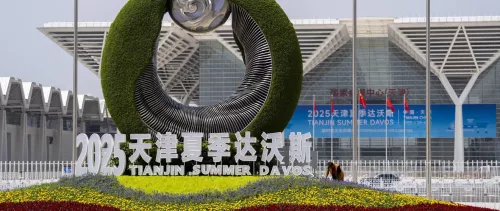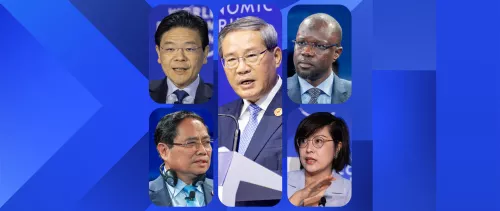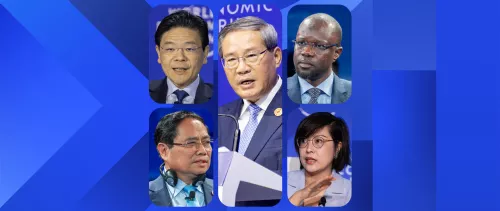
“We need to think of globalization not in the way it was done before, but differently" says, Ngozi Okonjo-Iweala, Director-General, World Trade Organization, speaking at the World Economic Annual Meeting 2024.
- Speaking in Davos 2024, World Trade Organization Director-General Ngozi Okonjo-Iweala called on leaders and policy-makers to rethink old growth models and ensure globalization works for all.
- “The reason globalization got a bad name is because poor people in rich countries were left out, and poor countries or developing countries were at the margin,” she said.
- Davos 2024, the Annual Meeting of the World Economic Forum, takes place from 15–19 January in Davos, Switzerland.
In the past four years, on many measures, economic progress has stalled. Trade growth has been sluggish. Pandemic, geopolitical and climate-related shocks have caused supply chain turmoil. Near-shoring, reshoring and onshoring have been ticking up, as has protectionism.
In certain ways, it feels like the world has been turning its back on globalization.
“The world was going on a trajectory of globalization and trade until 2020, and then, a lot of things happened that moved us away from that trajectory,” Khaldoon Khalifa Al Mubarak, Chief Executive Officer and Managing Director at Mubadala Investment Company, told participants at the World Economic Forum Annual Meeting 2024, in a session titled No Recovery without Trade and Investment. That’s problematic, he added, because “with economic development comes prosperity, with prosperity comes stability, with stability ultimately you have peace.”
But World Trade Organization (WTO) Director-General Ngozi Okonjo-Iweala, who spoke on the same panel as Al Mubarak, shared an important message for leaders and policy-makers: as we look for new growth models, we must ensure that they’re far more inclusive than those of the past.
“We need to think of globalization not in the way it was done before, but differently. And we need to make sure that those who did not benefit during the first round benefit this time,” she said. “The reason globalization got a bad name is because poor people in rich countries were left out, and poor countries or developing countries were at the margin. In the new paradigm, we don’t want to repeat the same story.”
Okonjo-Iweala also shared some ideas on how we can go about doing that in a pragmatic way that takes into account countries’ concerns about issues like supply chain resilience.
“We have a paradigm at the WTO that can help us do this,” she explained, referring to that paradigm as reglobalization.
“We can diversify our supply chains, deconcentrate those sectors and geographies that are causing a problem by diversifying them to developing countries and other parts of the world that have the right business environment.” It is, she added, something that has already been happening between economies in Europe and Africa. For example, in December, Rwanda and the European Investment Bank announced an alliance to boost investment in critical raw material value chains.
Okonjo-Iweala’s sentiment was echoed by other session panellists, including Canadian Deputy Prime Minister Chrystia Freeland. “As we build our economic policies, the question we have to ask is: will this make the life of the people I represent better?”
- The session ‘No Recovery without Trade and Investment’ was moderated by Børge Brende, President of the World Economic Forum, with the following participants:
- Valdis Dombrovskis, Executive Vice-President for an Economy that Works for People; Commissioner for Trade, European Commission
- Ngozi Okonjo-Iweala, Director-General, World Trade Organization
- Khaldoon Khalifa Al Mubarak, Chief Executive Officer and Managing Director, Mubadala Investment Company
- Chrystia Freeland, Deputy Prime Minister and Minister of Finance of Canada
- Brian Moynihan, Chair and Chief Executive Officer, Bank of America
Click to watch the full session:


